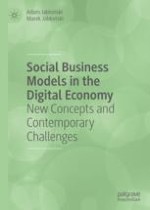2020 | OriginalPaper | Chapter
3. New Economy Business Models in the Concepts of Big Data, the Sharing Economy and the Circular Economy
Authors : Adam Jabłoński, Marek Jabłoński
Published in: Social Business Models in the Digital Economy
Publisher: Springer International Publishing
Activate our intelligent search to find suitable subject content or patents.
Select sections of text to find matching patents with Artificial Intelligence. powered by
Select sections of text to find additional relevant content using AI-assisted search. powered by
